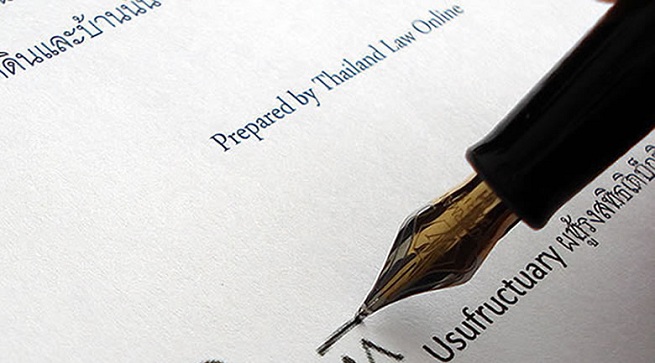Usufruct in Thailand. In Thailand, where foreign ownership of land is restricted, usufruct offers a unique opportunity for foreigners to experience the benefits of property ownership. This concept grants individuals (usufructuaries) the right to use and enjoy immovable property (land or buildings) owned by someone else (the owner).
What is Usufruct?
In Thai law, usufruct, known as “Sidhi-kep-kin,” grants a person (the usufructuary) the right to use and enjoy immovable property (land or buildings) owned by another (the owner). The usufructuary can live in the property, rent it out, or cultivate the land, reaping any profits generated.
Benefits of a Usufruct Agreement
Usufruct offers several advantages, particularly for foreign individuals:
- Land Enjoyment: Foreigners are prohibited from owning land in Thailand. Usufruct provides a way to gain rights to use and enjoy the property for a set period. This is especially beneficial for those who dream of retiring in Thailand or owning a vacation home.
- Long-Term Commitment: Usufruct agreements can be established for extended periods, even a lifetime, offering stability and security. Unlike a lease, which can be terminated by the landlord at the end of the term, a usufruct agreement guarantees the right to use the property for the agreed-upon duration.
- Profit Potential: The usufructuary can rent out the property or utilize it for commercial purposes, generating income. This can be a significant advantage for investors seeking to earn returns on their investment in Thai property.
Responsibilities of a Usufructuary
While enjoying the benefits, the usufructuary also has important responsibilities:
- Maintaining the Property: They are obligated to maintain the property in good condition, just like a responsible owner. This includes making necessary repairs and upholding the general upkeep of the property to ensure it remains in a habitable state.
- Taxes and Upkeep: The usufructuary is responsible for property taxes, maintenance costs, and utilities. They are essentially assuming the financial burden of ownership for the duration of the usufruct agreement.
- Returning the Property: Upon termination of the agreement, the property must be returned to the owner in the same condition it was received. Normal wear and tear is expected, but any significant damage caused by the usufructuary’s negligence could result in financial penalties.
Establishing a Usufruct Agreement
A usufruct agreement is a formal contract requiring careful consideration. Key points include:
- Duration: The agreement should clearly define the usufruct period, whether a fixed term (such as 30 years) or a lifetime grant.
- Termination Clauses: Outline the circumstances under which the agreement can be terminated by either party. This may include situations like failure to uphold maintenance obligations or the death of the usufructuary.
- Restrictions on Use: Specify any limitations on how the usufructuary can utilize the property. For example, the owner may restrict subletting the property or using it for certain commercial activities.
- Registration: For the usufruct to be legally binding, it must be registered at the local Land Department. This ensures the agreement is enforceable and protects the rights of both the usufructuary and the owner.
Seeking Professional Guidance
Usufruct agreements can be complex. Consulting with a lawyer experienced in Thai property law is crucial to ensure the agreement protects the interests of both the usufructuary and the owner. They can guide you through the drafting process, registration, and answer any questions you may have. By understanding the rights and responsibilities associated with usufruct, you can leverage this legal tool to enjoy the benefits of property ownership in Thailand.
